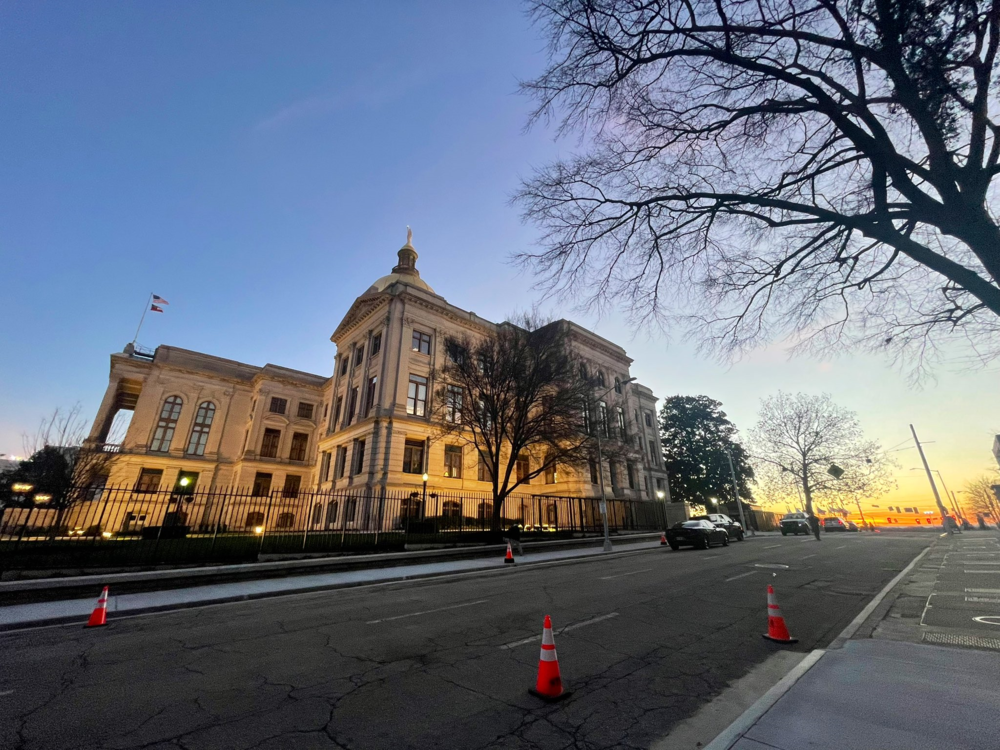
Caption
The General Assembly is currently controlled by Republicans, who expect to retain their majorities in both the state Senate and House in 2024's elections.
Credit: Riley Bunch, GPB News

The General Assembly is currently controlled by Republicans, who expect to retain their majorities in both the state Senate and House in 2024's elections.
ATLANTA — Georgia is among only seven “battleground” states this year, where the presidential election is too close to call and the campaigns of both Donald Trump and Kamala Harris are spending most of their time.
But Peach State Republicans believe they will still be in control of both the state House and Senate when the dust settles from the Nov. 5 General Assembly contests.
“It’s very difficult to maintain a majority in a 50-50 state,” said Brian Robinson, a former top aide to former GOP Gov. Nathan Deal and a consultant to Georgia House Republicans this year. “But Republicans are confident they will be able to maintain their majority.”
Democrats have been making inroads in Georgia in recent years thanks to the state’s increasingly diverse population. Ethnic minorities, including Blacks, Latinos, and Asian Americans, have tended to vote for Democrats.
Two years ago, Democrats gained one seat in the Georgia Senate and two in the House. During the 2020 election cycle, Georgians elected two Democrats to the U.S. Senate, and Joe Biden became the first Democratic presidential candidate to carry Georgia since Bill Clinton in 1992.
But the 2022 results still left Republicans holding 101 House seats to 79 for the Democrats, which shrunk to 78 in July of last year when then-Democratic Rep. Mesha Mainor switched to the GOP. The 2022 elections also left Republicans in firm control of the state Senate, 33-23.
Next month’s elections are expected to yield further small gains for the Democrats. In the House, Mainor’s seat — with a white voting-age population of only 34% — is likely to remain in Democrats’ hands.
Sen. Elena Parent, D-Atlanta, who chairs the Senate Democratic Caucus, said her party’s top target is Republican Shawn Still, R-Norcross, whose 48th Senate District has a minority voting-age population of more than 45%.
There’s also the baggage of Still having been among the Republican “fake” electors indicted in the Georgia election interference case against Trump. Still and others in that group have said they acted on the advice of GOP lawyers to preserve Trump’s legal options as he pursued a lawsuit challenging the 2020 results in Georgia.
A key reason Republicans expect to minimize their losses in the General Assembly this year despite the state’s changing demographics is that the GOP was in charge of redrawing Georgia’s congressional and legislative maps during last year’s redistricting session.
The House map pitted four sets of incumbent Democrats against each other, prompting two incumbents to decide not to seek reelection rather than oppose another Democratic incumbent. Two others ran against each other in the May primaries, and another lost her primary to a Democratic newcomer.
In the Senate, Democrats accused Republicans of partisan gerrymandering by going beyond the areas a judge had identified as in need of redrawing to reduce Black voting strength in several other districts.
“(Republicans) did whatever they could,” Parent said. “But it wasn’t foolproof.”
While the maps redrawn by the General Assembly’s Republican majorities likely will hold the Democrats to minimal gains in the state House and Senate, no changes are expected in the makeup of Georgia’s congressional delegation.
The congressional map the legislature adopted last year essentially swaps the 6th and 7th congressional districts.
It converts the Republican-leaning 6th District into a more heavily Republican 7th District that abandons increasingly diverse Gwinnett County and runs north through GOP-friendly Forsyth, Dawson, and Lumpkin counties. The old 7th District, meanwhile, has been shifted into a 6th District in heavily Democratic south and central Fulton County, southern Cobb County, eastern Douglas County, and northern Fayette County.
As a result, incumbent U.S. Rep. Lucy McBath, D-Marietta, is running for the 6th District seat, and incumbent Rep. Rich McCormick, R-Suwanee, is running in the 7th District. The bottom line is expected to leave Republicans holding nine of Georgia’s 14 congressional seats to five for the Democrats.
This story comes to GPB through a reporting partnership with Capitol Beat News Service.
